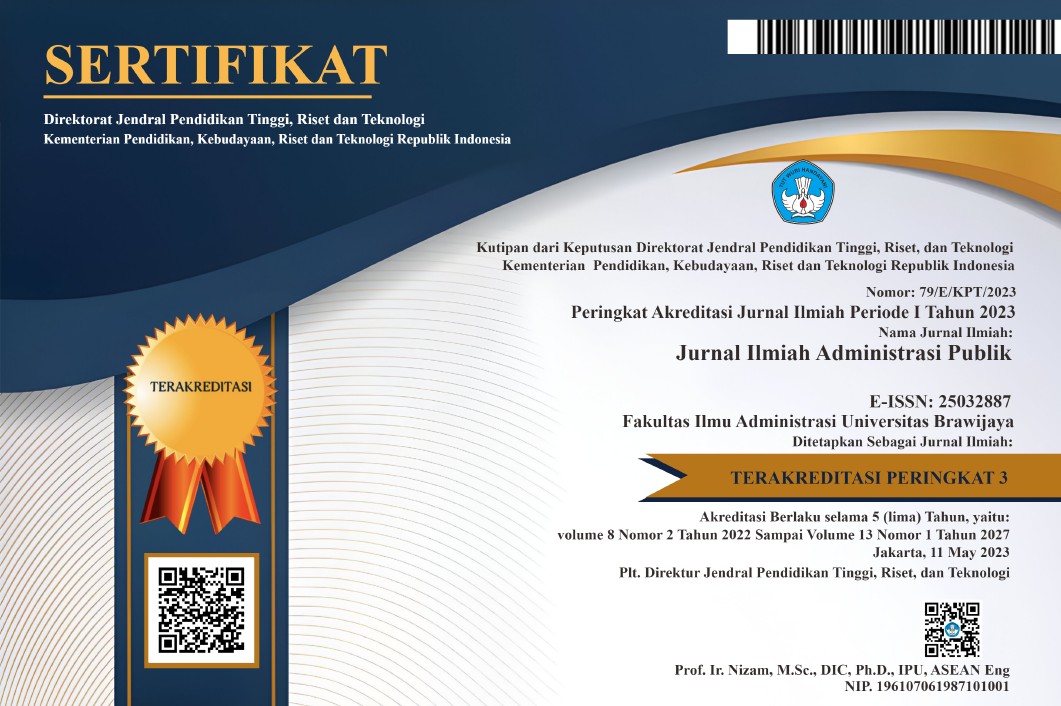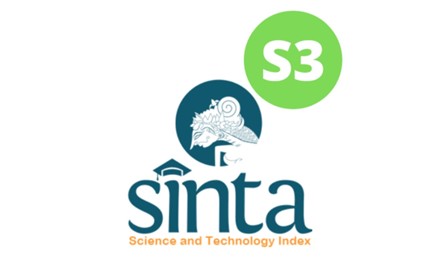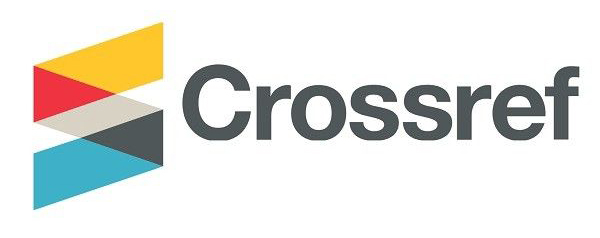E-Participation in Semarang Smart City
DOI:
https://doi.org/10.21776/ub.jiap.2020.006.03.6Keywords:
E-participation, Semarang Smart City, smart cityAbstract
Era 4.0 in the context of e-government is less relevant for discussing smart cities. Because smart city is not only about public services, but smart city has developed into a means of realizing community participation who are involved in government activities. Semarang Smart City is one of the Smart City products which is quite good and general with the conditions of other cities that apply smart cities as well. Using netnographic methods and literature studies by collecting data, information, research journals, books, and literature from trusted sources in written and digital form that are relevant to this research. In this paper, the author will describe several forms of e-participation in the Semarang City Smart City program. Semarang Smart City has been able to provide open services, a place for community aspirations. By knowing the form of e-participation that is applied in Semarang Smart City, it is hoped that it can provide an overview of other local governments that implement smart city programs to better understand the smart city program, and can realize various participatory and collaborative decision-making that is right on target in order to create a highly respected government. high transparency and accountability.References
Ahmed, Allam. (2007). Open Access Towards Bridging the Digital Divide–Policies and Strategies for Developing Countries. Information Technology for Development, 13(4), 337–361. DOI: 10.1002/itdj.20067
Antoni, Ahmad. (2019, November 18). Semarang Unggul dalam 9 Kategori Penilaian Kota Cerdas Indonesia. Retrieved from https://jateng.sindonews.com/read/11346/1/semarang-unggul-dalam-9-kategori-penilaian-kota-cerdas-indonesia-1574082703
Farhan, Y., Bahagijo, S., Suhirman., Susmanto., Rinusu., & Husbani, F. (2007). Memfasilitasi Konsultasi Publik: Refleksi Pengalaman Penyusunan Rancangan Peraturan Pemerintah tentang Tahapan, Tata Cara Penyusunan, Pengendalian, dan Evaluasi Pelaksanaan Rencana Pembangunan Daerah (RPP-T2CP2EPRPD). Bandung: Forum Pengembangan Partisipasi Masyarakat (FPPM).
Jayani, Dwi Hadya. (2019, September 9). Berapa Pengguna Internet di Indonesia? (Proyeksi Pengguna Internet di Indonesia 2017-2023). Databoks. Retrieved from https://databoks.katadata.co.id/datapublishembed/113177/berapa-pengguna-internet-di-indonesia
Kalampokis, E., Tambouris, E., & Tarabanis, K. (2008). A domain model for eParticipation: Proceedings of the 3rd International Conference on Internet and Web Applications and Services, 8-13 June 2008. Athens, Greece: IEEE. DOI: 10.1109/ICIW.2008.69
Kusnandar, V. B. (2019, September, 18). Berapa Jumlah Penduduk Kota Semarang?Jumlah Penduduk Kota Semarang Menurut Kelompok Umur dan Jenis Kelamin (2018). Retrieved from https://databoks.katadata.co.id/datapublish/2019/09/18/berapa-jumlah-penduduk-kota-semarang
NDI. (2013). Citizen Participation and Technology: An NDI Study. Washington DC: NDI.
ITB. (2019). Studio Tata Kelola Perkotaan 2019: Smart City Kota Semarang [slide powerpoint].Retrieved from https://issuu.com/adityapurnomoa/docs/30_april_2019-slide_presgab_fix_v2
Sæbø, Ø., Rose, J., & Skiftenes Flak, L. (2008). The shape of eParticipation: Characterizing an emerging research area. Government Information Quarterly, 25(3), 400–428. https://doi.org/10.1016/j.giq.2007.04.007
Sanjaya, A. (2017). Smart Communication Untuk Smart City Semarang. Paper presented at Bimbingan Teknis "Penyusunan Masterplan Smart City Semarang". DOI: 10.13140/RG.2.2.20767.87207
Schulz, Daniel., & Newig, Jens. (2015). Assessing online consultation in participatory governance: Conceptual framework and a case study of a national sustainability-related consultation platform in Germany. Environmental Policy and Governance, 25(1), 55–69. DOI: 10.1002/eet.1655
Semarang Smart City [image](n.d). Accessed on September 2nd, 2020, retrieved from https://www.semarangkota.go.id/mainmenu/detail/aplikasi
Simamora, R. (2018). Petisi Online sebagai Alat Advokasi Kebijakan: Studi Kasus Change.Org Indonesia Periode 2015-2016. Jurnal Komunikasi Indonesia, 6(1), 57–67. https://doi.org/10.7454/jki.v6i1.8617
UNDESA. (2014). E-Government Survey: e-Government for the Future We Want. New York: UN.
Vrabie, Catalin I., & Tirziu, Andreea-Maria.(2016). E-participation – a Key Factor in Developing Smart Cities: Proceedings of the 11th Edition of The Internasional Conference European Integration – Realities and Perspectives (EIRP), 8-9 December 2016. Galati, Romania: EIRP
Walsh, Lucas. (2007). A case study of Public servants Engaged in E-consultation in Australia. International Journal of Electronic Government Research, 3(4), 20–37. DOI: 10.4018/jegr.2007100102
World Bank. (2015, May 19). E-Government. Retrieved from https://www.worldbank.org/en/topic/digitaldevelopment/brief/e-government
Downloads
Published
Issue
Section
License
If your paper is accepted, the author identified as the formal corresponding author for the paper will receive an email prompting them to login into Author Services; where via the JIAP Author Licensing Service they will be able to complete the license agreement on behalf of all authors on the paper.














